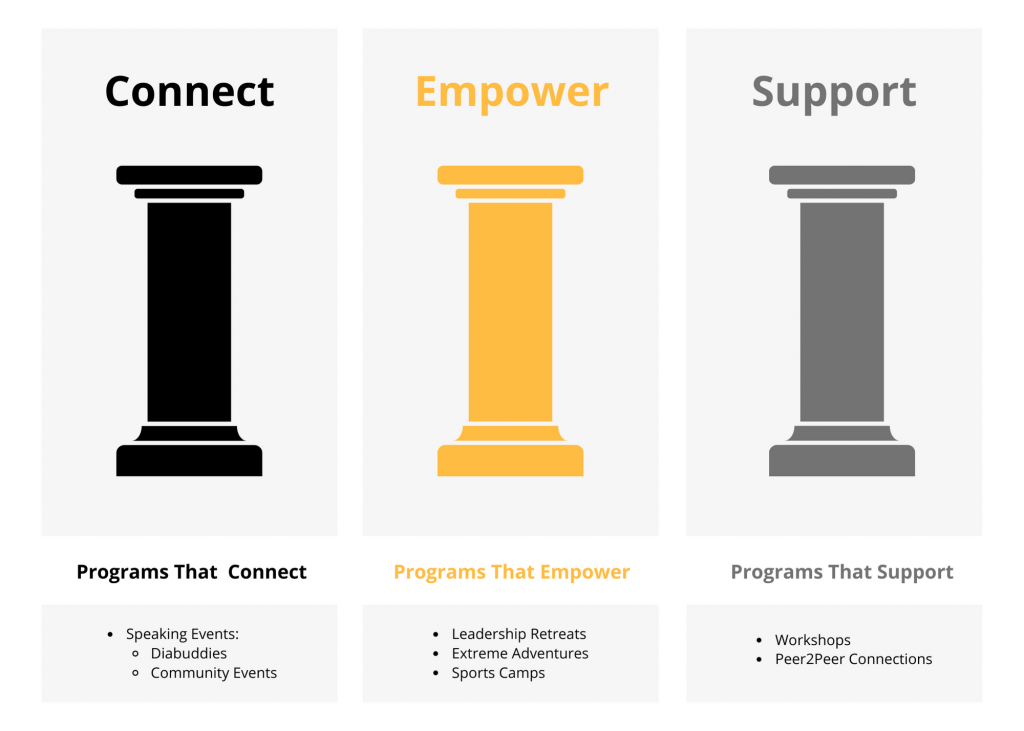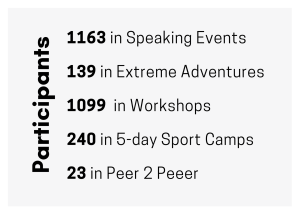Our Impact
Our Reason
Diabetes healthcare appointments are scheduled roughly every 3-6 months for a duration of 15 minutes. ICD helps change the narrative and provide support in between.

Over 300,00 Canadians live with type 1 diabetes.¹

Roughly 33,000+ are youth between the ages five and eighteen.²
Short Term Risks:³
- Diabetic ketoacidosis
- Unconsciousness
- Seizures
Long Term Complications:³
- Diabetic nephrophathy
- Retinopathy
- Peripheral neuropathy
- Arterial stiffness
- Hypertension
- Cardiovascular neuropathy
Every 24 hours 20+ Canadians die due to diabetes complications.⁴
Mental Illnesses Often Accompanying T1D:³
- Depression
- Anxiety
- Eating disorders
- Externalizing disorders
ICD’s Strategic Pillars of Programming.
ICD uses three pillars to fulfil our purpose. Each pillar equally targets the challenges surrounding type 1 diabetes, however they do so in their unique way. This is important as ICD realizes each person living with type 1 diabetes is unique even though they share the same disease.

Our Reach
In 2021 we had over 2,660 participants and had 227 days in program!

Our Results
We value feedback from our participants. Surveys are important to our growth as an organization.
“[Our patient’s] A1C when we checked it at this visit was 3.5% lower than 6 months ago, which is a hugely significant decrease… I had no idea that one experience could have the power to transform someone so profoundly. I believe that this ICD experience has set him on a completely different path. I believe these changes in him will lead to significant and lasting changes in his physical and mental health.”
-Joanne Gibson RD, CDE
”With the support from ICD, I have better control of my blood sugar levels and am testing more frequently than I ever have.”
– Nishant, T1D Participant
“Diabetes [management] is the starting point for a discipline that helps me in everything I do in life.”
– Michel, T1D Participant
“Site changes have been [Matt’s] struggle for years. After camp yesterday, Matt put on both a sensor and a new site all by himself. He really wanted to show us. He was so proud of himself. We can’t thank you enough for working with him!”
– Kim, Parent of a T1D
“We attended our first ICD event with our 5 year old (and his siblings) last week. He has tried giving himself his insulin before, but never quite went through with it (fear, nerves, etc). The day after meeting other kids with T1D, our son said he would like to give himself his injection – and has been doing it all week long! We are very proud of him and know it was because he was encouraged by seeing others do the same.”
– Parent of T1D
“Since the trip, I have felt more confident in managing my diabetes. I think that these kinds of programs are very important in the diabetes community and would definitely recommend ICD programs to others.”
– Ana, T1D Participant
2021 Highlights. See our Annual Report for the full story.

ICD As A Positive Force
85.5% of those surveyed reported ICD and its team being a positive force that they continue to look to outside of programs.

ICD Program Impact
95% of our surveyed participants reported having experienced a positive or transformative impact from an ICD event.
¹ JDRF (N.D) Type 1 Diabetes. 11 Nov 2020. https://www.jdrf.ca/who-we-are/type-1-diabetes/
² Canadian Pediatric Society 2017 New data shows more needs to be done to keep kids with diabetes safe at school. 11 Nov 2020. https://www.cps.ca/en/media/new-data-shows-more-needs-to-be-done-to-keep-kids-with-diabetes-safe
³ Diabetes Canada Clinical Practice Guidelines Expert Committee. Diabetes Canada 2018 Clinical Practice Guidelines for the Prevention and Management of Diabetes in Canada. Can J Diabetes. 2018;42(Suppl 1):S1-S325.
⁴ Diabetes Canada (N.D) About Diabetes – Type 1 Diabetes. 11 Nov 2020. https://www.diabetes.ca/about-diabetes/type-1

